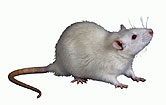- 8 Ways to Increase Dopamine Naturally
- 7 Best Breads for Maintaining Stable Blood Sugar
- Gelatin vs. Collagen: Which is Best for Skin, Nails, and Joints?
- The Long-Term Effects of Daily Turmeric Supplements on Liver Health
- Could Your Grocery Store Meat Be Causing Recurring UTIs?
- Are You Making This Expensive Thermostat Error This Winter?
- Recognizing the Signs of Hypothyroidism
- 10 Strategies to Overcome Insomnia
- Could Artificial Sweeteners Be Aging the Brain Faster?
- Techniques for Soothing Your Nervous System
Fatty, High-Calorie Diet Linked to Pancreatic Cancer in Mouse Study


WEDNESDAY, Oct. 2A high-fat, high-calorie diet may increase the risk of deadly pancreatic cancer, a new animal study suggests.
Researchers found that mice who became obese by eating high-calorie, high-fat diets developed abnormally high numbers of lesions known to be precursors to pancreatic cancer.
The study, published Sept. 30 in the journal Cancer Prevention Research, is the first to show a direct link in animals between obesity and the risk of pancreatic cancer, according to the researchers at the Jonsson Comprehensive Cancer Center at the University of California, Los Angeles.
However, findings in animals do not always bear out in human trials and while the study showed an association, it did not prove a cause-and-effect link between diet and pancreatic cancer risk.
The researchers did say that their findings support eating a low-fat, low-calorie diet as a way to prevent pancreatic cancer.
“The development of these lesions in mice is very similar to what happens in humans,” study leader Dr. Guido Eibl said in a UCLA news release. “These lesions take a long time to develop into cancer, so there is enough time for cancer-preventive strategies, such as changing to a lower-fat, lower-calorie diet, to have a positive effect.”
The researchers found that the mice fed the high-calorie, high-fat foods gained significantly more weight than mice on a lower-fat, lower-calorie regimen. They also had metabolic abnormalities, increased insulin levels and inflammation of pancreatic tissue.
Pancreatic cancer is one of the deadliest types of cancers. Overall five-year survival rates for this type of cancer are 3 percent to 5 percent, and the average length of survival after diagnosis is four to six months.
In many cases, patients only begin to develop symptoms when pancreatic cancer is in the advanced stages. There is a lack of effective treatments, so researchers are focusing on prevention strategies.
More information
The U.S. National Cancer Institute has more about pancreatic cancer.
Source: HealthDay
Copyright © 2026 HealthDay. All rights reserved.










